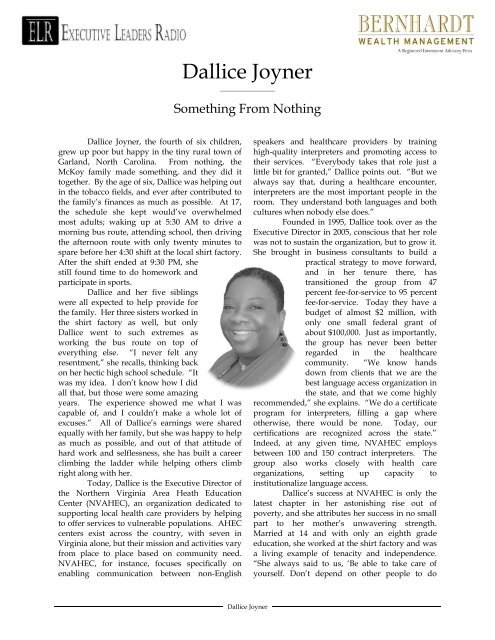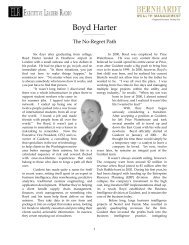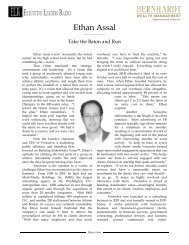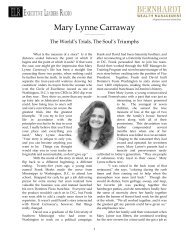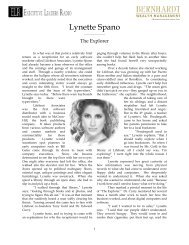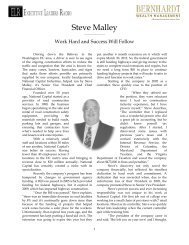Dallice Joyner - Executive Leaders Radio
Dallice Joyner - Executive Leaders Radio
Dallice Joyner - Executive Leaders Radio
You also want an ePaper? Increase the reach of your titles
YUMPU automatically turns print PDFs into web optimized ePapers that Google loves.
<strong>Dallice</strong> <strong>Joyner</strong><br />
_________________<br />
Something From Nothing<br />
<strong>Dallice</strong> <strong>Joyner</strong>, the fourth of six children,<br />
grew up poor but happy in the tiny rural town of<br />
Garland, North Carolina. From nothing, the<br />
McKoy family made something, and they did it<br />
together. By the age of six, <strong>Dallice</strong> was helping out<br />
in the tobacco fields, and ever after contributed to<br />
the family’s finances as much as possible. At 17,<br />
the schedule she kept would’ve overwhelmed<br />
most adults; waking up at 5:30 AM to drive a<br />
morning bus route, attending school, then driving<br />
the afternoon route with only twenty minutes to<br />
spare before her 4:30 shift at the local shirt factory.<br />
After the shift ended at 9:30 PM, she<br />
still found time to do homework and<br />
participate in sports.<br />
<strong>Dallice</strong> and her five siblings<br />
were all expected to help provide for<br />
the family. Her three sisters worked in<br />
the shirt factory as well, but only<br />
<strong>Dallice</strong> went to such extremes as<br />
working the bus route on top of<br />
everything else. “I never felt any<br />
resentment,” she recalls, thinking back<br />
on her hectic high school schedule. “It<br />
was my idea. I don’t know how I did<br />
all that, but those were some amazing<br />
years. The experience showed me what I was<br />
capable of, and I couldn’t make a whole lot of<br />
excuses.” All of <strong>Dallice</strong>’s earnings were shared<br />
equally with her family, but she was happy to help<br />
as much as possible, and out of that attitude of<br />
hard work and selflessness, she has built a career<br />
climbing the ladder while helping others climb<br />
right along with her.<br />
Today, <strong>Dallice</strong> is the <strong>Executive</strong> Director of<br />
the Northern Virginia Area Heath Education<br />
Center (NVAHEC), an organization dedicated to<br />
supporting local health care providers by helping<br />
to offer services to vulnerable populations. AHEC<br />
centers exist across the country, with seven in<br />
Virginia alone, but their mission and activities vary<br />
from place to place based on community need.<br />
NVAHEC, for instance, focuses specifically on<br />
enabling communication between non-English<br />
speakers and healthcare providers by training<br />
high-quality interpreters and promoting access to<br />
their services. “Everybody takes that role just a<br />
little bit for granted,” <strong>Dallice</strong> points out. “But we<br />
always say that, during a healthcare encounter,<br />
interpreters are the most important people in the<br />
room. They understand both languages and both<br />
cultures when nobody else does.”<br />
Founded in 1995, <strong>Dallice</strong> took over as the<br />
<strong>Executive</strong> Director in 2005, conscious that her role<br />
was not to sustain the organization, but to grow it.<br />
She brought in business consultants to build a<br />
practical strategy to move forward,<br />
and in her tenure there, has<br />
transitioned the group from 47<br />
percent fee-for-service to 95 percent<br />
fee-for-service. Today they have a<br />
budget of almost $2 million, with<br />
only one small federal grant of<br />
about $100,000. Just as importantly,<br />
the group has never been better<br />
regarded in the healthcare<br />
community. “We know hands<br />
down from clients that we are the<br />
best language access organization in<br />
the state, and that we come highly<br />
recommended,” she explains. “We do a certificate<br />
program for interpreters, filling a gap where<br />
otherwise, there would be none. Today, our<br />
certifications are recognized across the state.”<br />
Indeed, at any given time, NVAHEC employs<br />
between 100 and 150 contract interpreters. The<br />
group also works closely with health care<br />
organizations, setting up capacity to<br />
institutionalize language access.<br />
<strong>Dallice</strong>’s success at NVAHEC is only the<br />
latest chapter in her astonishing rise out of<br />
poverty, and she attributes her success in no small<br />
part to her mother’s unwavering strength.<br />
Married at 14 and with only an eighth grade<br />
education, she worked at the shirt factory and was<br />
a living example of tenacity and independence.<br />
“She always said to us, ‘Be able to take care of<br />
yourself. Don’t depend on other people to do<br />
<strong>Dallice</strong> <strong>Joyner</strong>
things for you.’” <strong>Dallice</strong> recalls. “And we took that<br />
and have used it in our lives. I’ve always had a<br />
sense that, if I want to do something, no one is<br />
going to do it for me.”<br />
Along with working in tobacco fields from<br />
age six, she and her three older sisters worked in<br />
the blueberry fields every summer from early<br />
morning until evening. Her mother’s attitude of<br />
“do what you’ve got to do” rubbed off on all of her<br />
children, and <strong>Dallice</strong> remembers the long days in<br />
the blueberry fields as happy ones. Although the<br />
family was close, her father, a butcher at the local<br />
grocery store, suffered from alcoholism<br />
throughout her childhood, finally getting sober<br />
twenty years ago—and for those years, <strong>Dallice</strong> is<br />
profoundly grateful.<br />
In tiny Garland, only 28 students<br />
graduated in <strong>Dallice</strong>’s high school class, and 16 of<br />
them black. Of the eight young black men, none<br />
attended college. Of the seven women, <strong>Dallice</strong><br />
was one of a few who went on to college, and one<br />
of the only young black women in her class to<br />
initially earn her Bachelor’s degree. She still<br />
fondly recalls the three high school teachers who<br />
were particularly instrumental in encouraging her<br />
talents, Mr. Norris, Ms. Boney, and Ms. Thompson.<br />
The latter two, as black women, served as<br />
aspirational role models. “If I stepped out of line,<br />
they would either call my mom or show up at my<br />
house!” she laughs today. “There was constant<br />
communication between all of them, and they<br />
were genuinely interested in me and my future.”<br />
After graduation, <strong>Dallice</strong> went on to pursue her<br />
B.S. in Health Education, and then reluctantly<br />
returned to Garland to look for work.<br />
Her first job out of school was with the<br />
Health Department of her home county, providing<br />
blood pressure checks and health education for<br />
rural communities. Despite long hours, the<br />
position was a rewarding one. “Going into the<br />
community really reinforced my love for people,<br />
and for being able to make things happen,” she<br />
says, remembering her experiences as a health<br />
educator. She recalls the creativity necessary for<br />
running programs with few or no resources; in one<br />
community, she was sent to help raise awareness<br />
in women of high blood pressure and the<br />
importance of exercise, but a suitable place for<br />
aerobic activity was difficult to come by. Adept by<br />
now at making something out of nothing,<br />
however, she asked the local men to give up half of<br />
their basketball court for the purpose, and twice a<br />
week, she would drive 50 miles each way with a<br />
boombox and cassette tape to teach.<br />
Two years later, as she was preparing to<br />
leave for a new job, the town decided to organize a<br />
walk-a-thon for the American Heart Association.<br />
It had been <strong>Dallice</strong>’s enthusiasm and passion that<br />
had gotten the people genuinely interested in their<br />
health, and she was able to move on in her career<br />
with a profound sense of accomplishment. Taking<br />
care of people—and helping people take care of<br />
themselves—has thus been the focus of her life<br />
ever since. “One of the things I concluded in my<br />
early adult years about my passion is that, of<br />
course, things are important,” she admits. “Houses<br />
are important and money is important. But people<br />
are our greatest commodity, and in my mind,<br />
that’s where our investment should be.”<br />
After three years living back in Garland,<br />
<strong>Dallice</strong> knew it was time for a change. Most<br />
people there stayed put, and even her mother was<br />
shocked when <strong>Dallice</strong> accepted a job offer from the<br />
Health Department in Winston-Salem. But <strong>Dallice</strong><br />
had a plan: she would go to graduate school and<br />
further advance herself.<br />
The Health Department in Winston-Salem<br />
was a vastly different environment from the one<br />
she’d left behind, but she had to learn how to<br />
apply the skills she’d acquired in Garland to a<br />
much more resource-rich community, and to adapt<br />
to an urban health department. “That transition<br />
taught me a whole lot,” she details. “It taught me<br />
how to be much more versatile, whatever<br />
environment I was in.” Her boss also proved to be<br />
a great inspiration, especially when at the end of<br />
her first year, she was given a “fair” on her<br />
employee evaluation. Livid, she demanded to<br />
know why. Her boss replied that, while her work<br />
was good, she never took any risks, and that push<br />
was all <strong>Dallice</strong> needed to begin fully embracing<br />
her potential. “It made a world of difference,<br />
because she saw things in me that I didn’t see,”<br />
<strong>Dallice</strong> affirms. “That was the potential she was<br />
trying to pull out in me.” The next year, she<br />
received an “excellent” on her evaluation.<br />
Before she left Winston-Salem, she had<br />
obtained a Master’s in Education, with a<br />
concentration in Community Health, and become<br />
the Health Education Director. She had twelve<br />
people working under her, and she was building<br />
the leadership skills she would need to<br />
successfully run NVAHEC. Her next position was<br />
as a consultant for the state government, and here<br />
Profiles in Success: Inspiration from <strong>Executive</strong> <strong>Leaders</strong> in the Washington D.C. Area
too she found a mentor in an effective boss, yet<br />
another influence who helped shape her<br />
leadership skills. <strong>Dallice</strong> watched her boss<br />
carefully over three years. “Not a month goes by<br />
that I don’t use something she taught me,” she<br />
says. From that consulting position, she then<br />
moved on to run NVAHEC.<br />
As a leader, <strong>Dallice</strong> thinks of herself as<br />
hands-off in general but intolerant of poor quality<br />
of work. “I’m relatively laid back as a leader,<br />
especially if I’ve got the right staff in place,” she<br />
explains. “To me, it’s important to have a staff that<br />
I trust and respect, that I believe in, who can get<br />
things done. I like to be able to delegate a<br />
responsibility and not dictate how it happens. I<br />
consider micromanaging to be babysitting adults,<br />
and I’m not good at it!” Fortunately, after eight<br />
years of running NVAHEC, she feels she has in<br />
place a dependable staff that trusts her vision and<br />
operates effectively.<br />
Her personal life, as well, is a tremendous<br />
source of happiness for <strong>Dallice</strong>. Married for 24<br />
years, her husband, 21-year-old daughter, and 17-<br />
year-old son are her greatest priorities. “They are<br />
my main motivation,” she avows. “At the end of<br />
the day, as long as my husband, my children, and<br />
my dog think I’m the neatest person in the world, I<br />
know I’ve done the right thing.”<br />
Her husband’s support has been a major<br />
positive force as she’s fought to build her career.<br />
“He’s one of my biggest cheerleaders,” she smiles.<br />
“One of the things I appreciate so much about him<br />
is that he’s never tried to hold me back<br />
professionally. Instead, he celebrates every move I<br />
make.” For someone dedicated to investing in<br />
people, it’s hardly surprising that family is so<br />
important to <strong>Dallice</strong>—she also maintains constant<br />
contact with her mother and siblings, all of whom<br />
remain in North Carolina.<br />
As someone whose legacy revolves around<br />
the vital contributions she’s made to her family<br />
and to society, <strong>Dallice</strong> believes young adults are a<br />
particularly important group to be investing in.<br />
“Guidance and assistance at this crucial time in a<br />
person’s life can turn into a lifetime of success,”<br />
she points out. That’s why, when advising young<br />
people entering the working world today, <strong>Dallice</strong><br />
advocates for the importance of education while<br />
also reminding us that education isn’t everything.<br />
“I tell people all the time that my mom is<br />
the smartest person I know, and she has an eighth<br />
grade education level,” <strong>Dallice</strong> points out.<br />
“Keeping that perspective, I think, is very<br />
important. Education is certainly vital, but it’s not<br />
going to get you through everything in life.”<br />
Indeed, more important than any degree is hard<br />
work, a strong will, and an empathetic heart; three<br />
things <strong>Dallice</strong> <strong>Joyner</strong>, like her mother before her,<br />
have used to make something out of nothing and<br />
to really make something of themselves.<br />
By Gordon J. Bernhardt, CPA, PFS, CFP ® , AIF ®<br />
About Gordon J. Bernhardt<br />
President and founder of Bernhardt Wealth<br />
Management and author of Profiles in Success:<br />
Inspiration from <strong>Executive</strong> <strong>Leaders</strong> in the<br />
Washington D.C. Area, Gordon provides financial<br />
planning and wealth management services to affluent<br />
individuals, families and business-owners throughout<br />
the Washington, DC area. Since establishing his firm<br />
in 1994, he and his team have been focused on<br />
providing high-quality service and independent<br />
financial advice to help clients make informed decisions<br />
about their money. For more information, visit<br />
www.BernhardtWealth.com and Gordon’s Blog.<br />
________________________<br />
<strong>Dallice</strong> <strong>Joyner</strong>
Profiles in Success: Inspiration from <strong>Executive</strong> <strong>Leaders</strong> in the Washington D.C. Area


